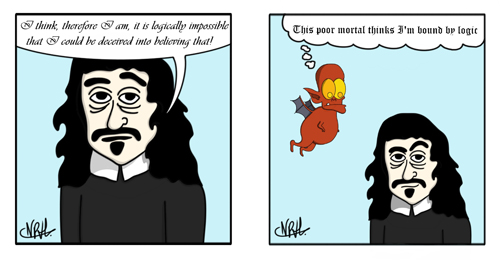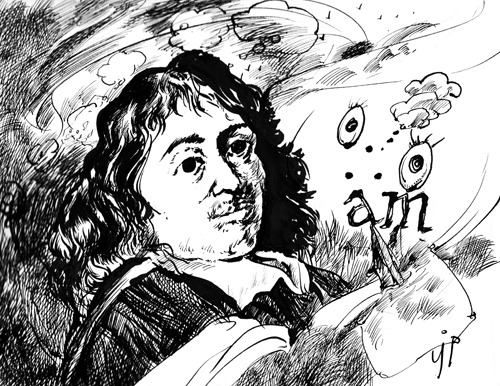
Your complimentary articles
You’ve read one of your four complimentary articles for this month.
You can read four articles free per month. To have complete access to the thousands of philosophy articles on this site, please
Descartes
Ergoing Nowhere
Noah Harris says Descartes failed to find absolute foundations for knowledge.
Cogito ergo sum: ‘I think, therefore I am.’ This statement by René Descartes, which has become known as ‘the Cogito’, is perhaps the most famous phrase in all of philosophy. It summarises his argument that one’s own existence is the only thing one can never be mistaken about. In his Meditations on First Philosophy (1641), he argues that with every other proposition – even those of basic mathematics – it may be that every time I think them, an all-powerful demon interferes with my mind and deceives me, leading me to be mistaken. For example, every time I think about 2+3, this demon may be interfering to make me believe the total is 5, when actually it’s something else. Indeed, I might be being deceived by this demon about perhaps everything I think I know. Perhaps my belief that I went to the shop last week is based on a memory which has been entirely fabricated by the demon.
However, there is something different about the proposition ‘I exist’. This is because I cannot be deceived about something unless I exist – more specifically, unless I exist as a thing capable of being deceived, that is, a thinking thing. However, if I have to exist in order to be deceived about anything, I would have to exist in order to be deceived about the proposition ‘I exist’ too. To be deceived about this proposition would therefore require both that I exist, in order to be a thing which can be deceived, and that I do not exist, in order for the proposition ‘I exist’ to be deceptive. As Descartes argues, this contradiction shows that it is impossible to be deceived about the proposition ‘I exist’. Therefore, for anyone who thinks ‘I exist’, it must be true. So: I think, therefore I am.
With this argument, Descartes believed he had found a statement which could be known without any prior assumptions or knowledge, and which could therefore be used as a ‘certain and unshakeable’ foundation for further propositions about the world, and hence for human knowledge in general. However, Descartes’ attempts to derive anything further from the Cogito famously failed, quickly devolving into a reliance on the benevolence of God, with the dubiousness of his arguments for this idea undermining the certainty of his resulting propositions. However, I want to briefly question whether Descartes ever secured the certainty which he sought even in his first proposition.
Descartes’ ‘evil demon’ argument aims to go as far as is possible in questioning our beliefs, allowing for the possibility that this demon could even deceive us about the most basic mathematical truths. Only by taking scepticism to this absolute extreme can Descartes legitimately claim to have found something absolutely beyond question. However, Descartes does not go to the absolute extreme. This is because Descartes’ argument still relies on the laws of logic. Without such laws, the cogito itself is immediately undermined. To be deceived about the proposition ‘I exist’ requires a contradiction; but without the logical law of non-contradiction, that would be unproblematic. In fact, without the law of non-contradiction, we could agree with Descartes’ argument all the way through to its conclusion, and yet prefer the opposite conclusion.

Cartoon © Noah Harris 2023
My aim here is to point out that any attempt to undertake Descartes’ project – to discover what we can know to be certain and free from all presuppositions – is bound to either fail or show that we know nothing. We can go absolutely nowhere in argument without the laws of logic. However, these laws cannot themselves be proven, for we would have to presuppose them in order to construct an argument for them! Therefore we can know absolutely nothing independently of absolutely everything. This failure is crucial for Descartes’ project, because his concern was that unless the foundations of his thought were certain and without presuppositions, everything he built upon them ‘‘could only be highly doubtful’’ (p.13). So to question everything but the laws of logic undermines his project not at the last hurdle, but at the first.
Perhaps, however, there is still something we can take from his argument. Even though his Meditations fail to fulfil his stated aim of questioning everything, one might argue that Descartes covertly settled for a more modest project – one of questioning everything it’s practically possible to question. If he had questioned absolutely everything, including logic, his Meditations would not merely have failed to uncover any certain truths, but would have ended up as a collection of gibberish. It may be that Descartes decided, or simply assumed, therefore, to presuppose the bare minimum, the laws of logic, in order to uncover those propositions which are most certain – that is, which are as certain as the laws of logic themselves. The cogito is not, therefore, the one absolutely certain proposition; but it is the one other proposition which is as certain as the laws of logic.

Image © Venantius J Pinto 2023. To see more of his art, please visit behance.net/venantiuspinto
Strangely, this perhaps improves our prospects in terms of grounding our propositions. Descartes’ attempts indicate that the cogito and the laws of logic alone may be insufficient to derive any further certain propositions; but having accepted the lack of absolute certainty in our propositions, perhaps we can at least move forward by ranking the certainty of further propositions by considering what else must be supposed for each to be true. The cogito takes the highest rank, requiring only the laws of logic for its truth. No doubt this ranking would be a long and complicated task; but it holds far more promise than attempting to derive a full body of knowledge from the single premise that one exists.
Descartes’ goal was to purge our minds of all except the absolutely certain. A hierarchy of beliefs would fall short of this, but would show us the lines of reasoning and implicit affirmations behind our beliefs, thereby informing rather than removing the decision process. It seems that this is the most we can take from Descartes’ cogito.
© Noah Harris 2023
Noah Harris is a Sheffield-based recent philosophy graduate of Keele University.









